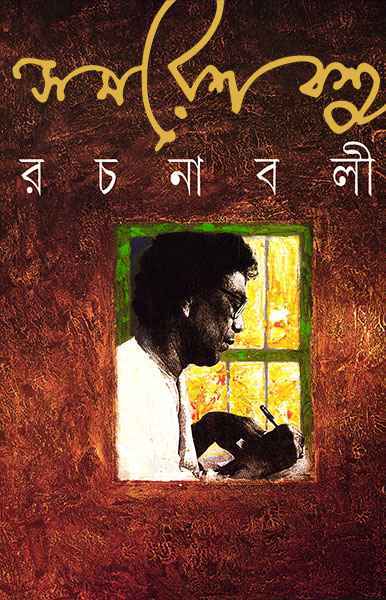Samaresh Basu Rachanabali 1
Samaresh Basu Rachanabali 1 is backordered and will ship as soon as it is back in stock.
Couldn't load pickup availability
Genuine Products Guarantee
Genuine Products Guarantee
We guarantee 100% genuine products, and if proven otherwise, we will compensate you with 10 times the product's cost.
Delivery and Shipping
Delivery and Shipping
Products are generally ready for dispatch within 1 day and typically reach you in 3 to 5 days.
🔹 Author: Samaresh Basu
🔹 ISBN: 9788172155889
🔹 Cover: Hardcover
🔹 Pages: 704
🔹 Weight: 936 grams
About Samaresh Basu
Samaresh Basu, often referred to as the "Prince of Bengali literature", was a literary giant whose works traversed multiple genres and themes, blending life's raw realities with profound philosophical reflections. His journey from humble beginnings to literary prominence mirrored the very essence of struggle and resilience, both in his life and in his writing. Basu's contributions to Bengali literature are vast and diverse, encompassing novels, short stories, and essays, often characterized by his unflinching portrayal of human complexities.
Basu was known for his unique narrative style that was both direct and evocative. He believed that life itself was a continuous journey, and his writing reflected that very fluidity and unpredictability. His approach was never bound by rigid moralities or societal conventions. Instead, he captured the raw, unrefined nature of human existence, delving into themes of love, relationships, survival, and human frailties.
In his own words, Samaresh Basu said:
“Sahityer ja kichu daay, se to jibaner’i kachhe. Sahityer theke jiban boro, e sathyer jonno sahityik ke ghorer anushilan korte hoy na, ta sathe sathe ati jibonto."
This means:
“Whatever responsibility literature carries, it lies with life itself. Life is greater than literature, and for this truth, the writer doesn’t need to practice deep meditation, it is always alive.”
His writing explores human beings deeply rooted in the earth, seeking to understand the human condition. He never turned anyone away, and in his stories, no one was excluded from the complexities of existence.
Themes and Writing Style
-
Human Complexity:
Basu’s characters are multi-dimensional, full of flaws and contradictions. They reflect the reality of life in its entirety, encompassing the extremes of both virtue and vice. His narratives delve deeply into the psychological state of his characters. -
Life and Literature:
He often blurred the boundaries between life and literature, suggesting that the essence of writing lies in its capacity to capture life’s rawness. Basu’s works do not preach but reveal life’s complexity, urging readers to reflect and ponder on their own lives. -
Human Relationships and Conflicts:
A major theme in Basu's work is the interplay of relationships—be it romantic, familial, or social. His characters often face deep internal conflicts, driven by love, guilt, or the search for meaning. -
Revolutionary Thinking:
In his writing, Samaresh Basu was not just a chronicler of human emotions but also of social changes, political shifts, and the impact of history on individual lives. He was deeply invested in observing and interpreting the political and social fabric of the time.
About the First Volume (Rachanabali 1)
This first volume of Samaresh Basu’s Rachanabali brings together his early works from 1951 to 1956, a formative period that defined the trajectory of his literary career. This volume includes:
-
Four Novels from 1951 to 1953:
- "Nayanpurer Mati" (The Soil of Nayanpur)
- "Uttorang" (Northern Landscape)
- "B.T. Roder Dhare" (By the B.T. Road)
- "Srimati Cafe" (Mrs. Cafe)
-
Three Short Story Collections from 1953 to 1956:
- "Moroshumer Ekdin" (One Day of a Season)
- "Akal Brishti" (Untimely Rain)
- "Shashtho Ritu" (The Sixth Season)
These works form the first phase or the "Udyan Parba" (The Beginning Phase) of Basu's writing career, where he explored themes of human survival, identity, and social change. The short stories reveal his mastery over the form, portraying poignant slices of life in contemporary Bengal, while his novels lay the foundation of the themes he would explore in the years to come.
Literary Journey and Transformation
Basu’s literary career is marked by a constant evolution. His writing underwent numerous transformations, and he never adhered to a single style or theme. His journey from the "Nayanpurer Mati" phase to the later political novels shows his ability to adapt and reinvent himself according to the times. His style transitioned from romanticism to realism and later to political and historical narratives.
Basu’s first pseudonym, "Kalakut", was born in 1952, but it became widely famous with the publication of "Amritakumbher Sandhane" (In Search of the Nectar of Immortality). This work heralded a new era of literary exploration, and the name Kalakut became synonymous with innovative writing that blended mythology, history, and political thought.
Conclusion
Samaresh Basu’s Rachanabali 1 provides an in-depth look into the early works of one of Bengali literature's most influential writers. His exploration of human nature, his pioneering role in the evolution of Bengali fiction, and his ability to seamlessly merge the personal with the political make him a timeless figure in literary history.
This collection is essential for readers seeking to understand the depth of Bengali literary tradition and the evolution of modern Bengali storytelling. For fans of Bengali literature and those interested in the cultural history of the region, Samaresh Basu’s works offer a compelling journey into the complexities of life, human relationships, and political landscapes.





